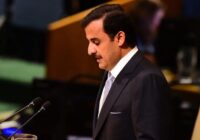The Saudi Arabia and UAE campaign to isolate Qatar and Iran puts non-Arab, Muslim nations between a rock and a hard place.
A Saudi and Emirati-driven campaign to isolate Qatar — and by extension Iran — puts non-Arab, Muslim states in a bind. It tests the degree of Saudi soft power garnered in decades of massive spending on the propagation of anti-Iranian, anti-Shia ultra-conservatism.
The campaign, building on a cyber and media war against Qatar, kicked into high gear on June 5 with Saudi Arabia, the United Arab Emirates, Bahrain and Egypt breaking off diplomatic relations — Yemen, Libya’s eastern-based government and the Maldives have since followed suit. It has also led to the halt of land, air and sea traffic with Qatar, and the suspension of the country’s participation in Yemen operations as part of a 41-nation Saudi-led, Pakistani-commanded military alliance. The suspension came a day after Doha said six of its soldiers had been wounded in Yemen “while conducting their duties within the Qatari contingent defending the southern borders of the Kingdom of Saudi Arabia.”
The four Arab countries announced their move in similar statements. Bahrain blamed Qatar’s “media incitement, support for armed terrorist activities and funding linked to Iranian groups to carry out sabotage and spreading chaos in Bahrain” for its decision. Bahrain, a majority-Shia nation ruled by a Sunni minority, has blamed Iran for a popular uprising in 2011 that it brutally squashed with the help of Saudi troops and for subsequent intermittent protests and violence.
The Saudi-Emirati campaign is reminiscent of a similar failed effort by Gulf states in 2014, but this time round sets the bar far higher: It aims to force non-Arab states to take sides in a four-decade-old proxy war between Saudi Arabia and Iran that has escalated in recent years, and to persuade the Trump administration to come down hard on Qatar because of its refusal to join the anti-Iranian Saudi bandwagon and its ties to Islamist and militant groups.
Qatar hosts the sprawling al-Udeid Air Base, the largest US military facility in the Middle East, which is home to the US Army’s Central Command and some 11,000 American troops.
WARNING QATAR: ROBERT GATES
Robert Gates, a former US defense secretary and director of central intelligence, recently warned at a Foundation for the Defense of Democracies gathering on Qatar and the Muslim Brotherhood that Doha risked losing its hosting of US forces if it failed to revise its policies. “The United States military doesn’t have any irreplaceable facility,” Gates said. Ed Royce, the Republican chair to the House Committee on Foreign Affairs, told the gathering that “if it doesn’t change, Qatar will be sanctioned under a new bill I’m introducing to punish Hamas backers,” a reference to Qatari support for the Palestinian Islamist group that controls the Gaza Strip.
The two men were speaking as the media and cyberwar erupted, with Qatari claims that several of its media websites had been hacked with a fake report attributing comments to Qatari Emir Sheikh Tamim bin Hamad al-Thani that were in line with the Gulf state’s policy but that Doha says he did not make. The US Federal Bureau of Investigation is helping Qatar investigate the alleged hack.
In a leaked email, UAE Ambassador to the United States Yousef al-Otaiba told Gates on the eve of his appearance at the foundation gathering that UAE Deputy Crown Prince Mohammed bin Zayed “sends his best from Abu Dhabi” and “he says ‘give them hell tomorrow.’” Otaiba was responding to an email in which Gates said that his appearance gave him a chance “to put some folks on notice.”
The rupture in diplomatic relations and military suspension, like the media campaign, ignored Qatar’s assertion that its websites had been hacked and treated the report as accurate.
On June 5, US Secretary of State Rex Tillerson, speaking on the sidelines of a bilateral meeting with Australian officials in Sydney that was also attended by Defense Secretary James Mattis, appeared to express implicit support for the Saudi-Emirati-led move. “I think what we’re witnessing is a growing list of some irritants in the region that have been there for some time. And obviously they have now bubbled up to a level that countries decided they needed to take action in an effort to have those differences addressed,” Tillerson said.
IMPACT ON NON-ARAB STATES
Scores of Muslim nations signed up for a military alliance created in 2015 by Saudi Deputy Crown Prince Mohammed bin Salman initially to support the kingdom’s military intervention in Yemen. The alliance’s purpose was reformulated to counter terrorism when it became clear that many Muslim nations, including Malaysia, Indonesia, and Pakistan, were reluctant to become embroiled in what had become, for Riyadh, a fiasco and public relations disaster. Non-Arab Muslim nations, insisting that their commitment was to protect the holy cities of Mecca and Medina and to counter political violence, were equally hesitant of being sucked into the kingdom’s all but military confrontation with Iran.
The latest rupture in Arab diplomatic relations with Qatar and the military alliance suspension raises the stakes for many non-Arab, Muslim nations. It threatens to jeopardize their relations with Qatar, a major gas supplier and economic and commercial partner, and force them to choose between Saudi Arabia and Iran.
In 2015, Pakistan’s diplomatic relations with Saudi Arabia and the UAE initially soured after parliament rejected a Saudi request for Pakistani military assistance in Yemen. The unprecedented decision ultimately left Islamabad with no choice when, two years later, Riyadh asked it to allow General Raheel Sharif, who had just retired as chief of army staff, to take over the command of the Saudi-led military alliance. Pakistan, despite insisting that Sharif would use his position to mediate between Saudi Arabia and Iran, has seen violence along its volatile border with Iran increase, relations with Tehran deteriorate, and prompted calls for Pakistan to recall the retired general.
Similarly, Malaysian Defense Minister Datuk Seri Hishammuddin Hussein announced in March that Malaysia and Qatar were elevating their diplomatic ties by forming a High Level Committee (HLC) to focus on the structural framework of both countries’ defense institutions. “There are only a few countries that we have elevated our relationship with (to the level of having an) HLC signed. And now, our relationship has reached a level that we can ink an HLC with Qatar, hopefully,” Hishammuddin said. In May, Malaysian Foreign Minister Datuk Seri Anifah Aman visited Qatar to further enhance relations with the Gulf state.
 Responding to the rupture in diplomatic relations and the military alliance suspension, sources close to the Malaysian foreign ministry said the government was advising its agencies to remain neutral in the dispute with Qatar. Some sources cautioned, however, that the defense and interior ministries may adopt a more independent approach.
Responding to the rupture in diplomatic relations and the military alliance suspension, sources close to the Malaysian foreign ministry said the government was advising its agencies to remain neutral in the dispute with Qatar. Some sources cautioned, however, that the defense and interior ministries may adopt a more independent approach.
Civil servants in the defense ministry expressed concern when, in 2016, Hishammuddin agreed to let 300 Malaysian paratroopers participate in a military exercise organized by the Saudi-led alliance. Critics in the ministry were further taken aback when the defense minister obliged them to endorse Saudi funding for the King Salman Center for Moderation (KSCM). The center, under the auspices of the ministry’s think tank, the Malaysian Institute of Defense and Security (MIDAS), seeks to counter jihadist messaging in Southeast Asia. An internal ministry memo said MIDAS had a “strategic interest to be collaborating with various institutions internationally particularly from Saudi Arabia.”
The views expressed in this article are the author’s own and do not necessarily reflect Fair Observer’s editorial policy.
Photo Credit: The White House
Support Fair Observer
We rely on your support for our independence, diversity and quality.
For more than 10 years, Fair Observer has been free, fair and independent. No billionaire owns us, no advertisers control us. We are a reader-supported nonprofit. Unlike many other publications, we keep our content free for readers regardless of where they live or whether they can afford to pay. We have no paywalls and no ads.
In the post-truth era of fake news, echo chambers and filter bubbles, we publish a plurality of perspectives from around the world. Anyone can publish with us, but everyone goes through a rigorous editorial process. So, you get fact-checked, well-reasoned content instead of noise.
We publish 2,500+ voices from 90+ countries. We also conduct education and training programs
on subjects ranging from digital media and journalism to writing and critical thinking. This
doesn’t come cheap. Servers, editors, trainers and web developers cost
money.
Please consider supporting us on a regular basis as a recurring donor or a
sustaining member.
Will you support FO’s journalism?
We rely on your support for our independence, diversity and quality.






